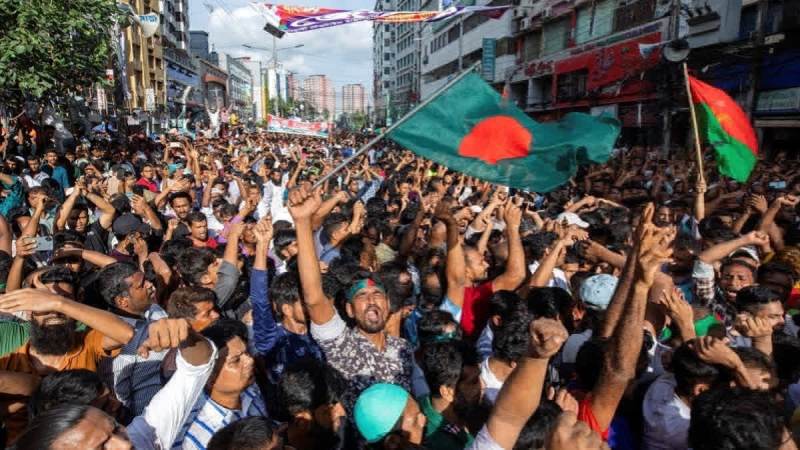Sheikh Hasina’s interviews with several western media outlets have clearly left Bangladesh’s Yunus regime rattled.
Coming at a time when the unconstitutional regime plans to pass judgement on the former Prime Minister through a now partisan and indeed irrelevant International Crimes Tribunal for crimes allegedly committed by her and possibly clamp a sentence of death on her.
These interviews are a powerful indication of why Sheikh Hasina still remains relevant in the country’s politics.
Indeed, the interviews, the texts of which will not be carried by the media in Bangladesh owing to instructions from the regime, point to a simple yet inevitable conclusion: any move to hold elections by the regime without the participation of the Awami League will render the whole exercise hollow.
With anywhere between 40% and 45% voters traditionally subscribing to the policies of the Awami League, a mass boycott by them of an election which will be pointless at best and a sham at worst will be an invitation to continued and, in fact, deepening instability.
Added to Sheikh Hasina’s comments are the sentiments voiced by G.M. Quader, chairman of the Jatiyo Party, a few days ago, to the effect that no elections can be held without the Awami League and the JP.
They are indicative of the winds of change that appear to have begun blowing across Bangladesh’s political landscape. And then there are the processions which followers of the Awami League and its affiliated organisations have been bringing out in Dhaka and elsewhere.
All these factors find increasing resonance among the public. Compounding the issues for the Yunus regime is the increasing number of reports relating to the repression against Awami League leaders and activists currently in incarceration.
Speculation has been rife about the number of these individuals who may have been done to death in prison.
It is, of course, too early to draw the conclusion that the Yunus regime is on its way out.
However, talk of the judiciary overseeing arguments related to a restoration of the caretaker system abolished by the Awami League government in 2011 throws up a few scenarios regarding the immediate future of politics in the country.
Assuming that the abolition of the caretaker system is declared null and void, the life of the Yunus regime automatically and immediately draws to an end.
Once the caretaker system is restored, it will be for the President of the republic to initiate the process of the formation of a new caretaker government, the modalities of which will include a selection of the individuals who will be part of the government.
In other words, a new caretaker government will enjoy the constitutional validity that the Yunus interim regime has never had.
The responsibility before the caretaker government, headed by the immediate past Chief Justice of the Supreme Court, will be three-fold: it will need to investigate the systematic assaults made on the rule of law since August 2024.
It will be required to take steps that will lift the ban illegally imposed on the Awami League and so empower it to return to the political centre; it will need to reconstitute the Election Commission with the overall purpose of free, fair, inclusive and therefore credible elections being held in the country.
A restoration of the caretaker system of government, given the predicament into which the country has been pushed by the long stretch of mob rule under the watch of the Yunus regime in the last fifteen months, is an absolute necessity for Bangladesh if the country is not to hit rock bottom.
It may even be that by the time a decision is taken to have the caretaker system restored — and that may well happen by or in December — it will be up to the President to step in and take over the control.
In other words, the scenario is similar to the conditions that prevailed in the country in 2007.
A partisan caretaker regime headed by President Iajuddin Ahmed was dismissed, and was replaced by a proper, non-partisan caretaker administration headed by the economist Fakhruddin Ahmed.
Conditions as they are currently shaping up in the country look eerily similar to the events of 2007.
Despite all such prognostications, however, the situation remains chaotic in Bangladesh and not just in politics.
The economy is in truly bad shape, with citizens unable to handle prices of essentials at shops and in open markets. Employment opportunities are steadily shrinking.
Thousands of garment workers have lost jobs in the past fifteen months. Education has been in free fall. Foreign investment, which has been the mantra of the Yunus regime, has not materialised.
An increasing number of countries have been refusing to provide visas for Bangladeshis.
But does the regime care? Its functionaries have been speaking in discordant voices on subjects with little or no understanding of them.
Besides, these functionaries have been observed proffering opinions on subjects that are clearly not in their remit. Some among them have achieved notoriety on social media through lashing out at a below-the-belt level at individuals whose points of view they cannot stomach.
Crudity has been weaponised to denigrate those critical of the Yunus regime.
ALSO READ: In Bangladesh, the clouds hang low and get darker
All said and done, though, Bangladesh’s people await deliverance from the anarchy, which descended on the country through the imposition of illegitimate rule in August 2024.
The road to that liberation will not be easy, but it will be a road where citizens will surely walk to reclaim their historical heritage.















